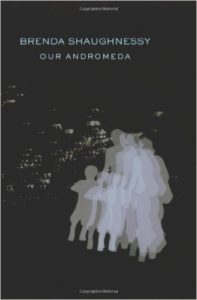Our Andromeda
 by Brenda Shaughnessy.
by Brenda Shaughnessy.
Copper Canyon Press, 2012,
$16, paper,
ISBN: 978-1-55659-410-6.
Buy the Book
We do artists few favors when we say, as a means of praise, that a work “hits home” — that some subject matter or other (oh subjectivity!) struck our sympathetic frequencies.
The ex-baseball player (for instance) whose favorite film is Field of Dreams, or the speedboat-owners toasting with Coronas before a Jimmy Buffett concert — how much do you trust their assessment of Kevin Costner’s emotional range or the lyrical depth of “A Pirate Looks at 40 ?”
They’ve seen a version of themselves, and they like what they see. And yet here I am under the spell of some poetic Propinquity Effect myself, wanting to tell you about weeping while I read Brenda Shaughnessy’s Our Andromeda aloud to my newborn daughter, as if a few tears might recommend a book.
How can you reconcile catastrophe and gratitude; burdens and blessings; terror and joy ? These are the concerns that sweat at the edges and burn at the heart of almost every poem in Our Andromeda.
Shaughnessy, whose son Cal suffered a brain injury during childbirth, uses Andromeda (both the book of her own making and the distant galaxy to which it refers) as a world of parallel projections. This is a world, as she wrote in a Poets & Writers essay, “in which my son was not injured at birth, a world in which he’d been allowed to live in his own body without the pain and restriction of cerebral palsy.”
A fantasy. A double-life. A different life, as she states in the title poem (which takes up roughly a fifth of the collection):
Wait till you see the doctors in Andromeda,
Cal. Yes, the doctors. It’s not the afterlife,
after all, but a different life.
The doctors are whole-organism empaths,
a little like Troi on The Next Generation
but with gifts in all areas of the sensate self.
Yes, 2012 seems to have been the year of refreshing sci-fi references in popular poetry. Tracy K. Smith’s Pulitzer Prize-winning Life on Mars got its lift from the space-stuff of Ziggy Stardust, Stanley Kubrick, and Edwin Hubble — searching the inner and outer dimensions for a mutable soul.
And in Shaughnessy’s Our Andromeda, where the fragile delivery of her son is described in terms of intergalactic travel, we get lines like this:
You came from Andromeda, Cal,
that other galaxy. Came to me, to us,
the moment you were born,
when the membrane between
worlds snapped and all that alien love
flooded my body. It came from you.
In her second collection, Human Dark with Sugar, Shaughnessy mixed the mythic with punk rock vim to decode moments of romantic longing. This time around, her desire is not zeroed-in on one specific absence, but aimed like buckshot at every future that would refuse her or her family, as in “Liquid Flesh”:
He howls with such fury and clarity
I must believe him.
No god has the power
to make me believe anything,
yet I happen to know
this baby knows a way out.
This dark hole closing in on me
all around: he’ll show me
how to get through
the shock and the godlessness
and the rictus of crushed flesh,
into the rest of my life.
And there is the hope, the stubborn motion forward. Shaughnessy is able to portray Cal not simply as an anchor for the book, but as the life at the center of her life, as the star feverishly pulsing in two galaxies at once:
Galaxies exploding everywhere
around us, exploding in us,
Cal, faster than the lightest light,
so much faster than love,
and our Andromeda, that dream,
I can feel it living in us like we
are its home. Like it remembers us
from its own childhood.
While the poet herself is suspicious of the intersection of “truth” and artifice (“Heart, what art you ?”she writes in “Artless”), I’m never far from feeling the off-the-page reality of these poems, in the most confessional of senses.
But why the tears ? Well, my girlfriend and I and our daughter had just gone through a highly traumatic birth experience, spent a couple weeks in the hospital, and come home to make our big adjustments. When I checked the mailbox on that first day back, Our Andromeda was waiting to be opened. All in one afternoon we read it to our daughter, and I cried, and cried, and cried.
Of course it would be crass as a reader and as a new father to say Our Andromeda “hits home.” My daughter recovered; Cal’s debilitation is permanent. And I hope that in making such contrasts and comparisons I’m not further condescending to Shaughnessy’s “sad new family struggling to find / blessings where blessings were.”
It’s just that in reading Our Andromeda, Brenda Shaughnessy’s defiant faith in love, all the more compelling for being hard-won, helped me better understand what it means to be a parent. Her poems help us see more clearly the ways in which love, if not the body, can be regenerative.
And “. . . if all possible / pain was only the grief of truth,” as Shaughnessy supposes in “All Possible Pain,” then solace must be possible in spite of that truth.
Or as she says in “Miracles:”
A light. Sailing a signal
flare behind me for another to find.
A scratch on the page
is a supernatural act, one twisting
fire out of water, blood out of stone.
We can read us. We are not alone.
Shaughnessy is the kind of poet for whom writing is not an act of mere relating, but of relation.
— Christopher Robley

